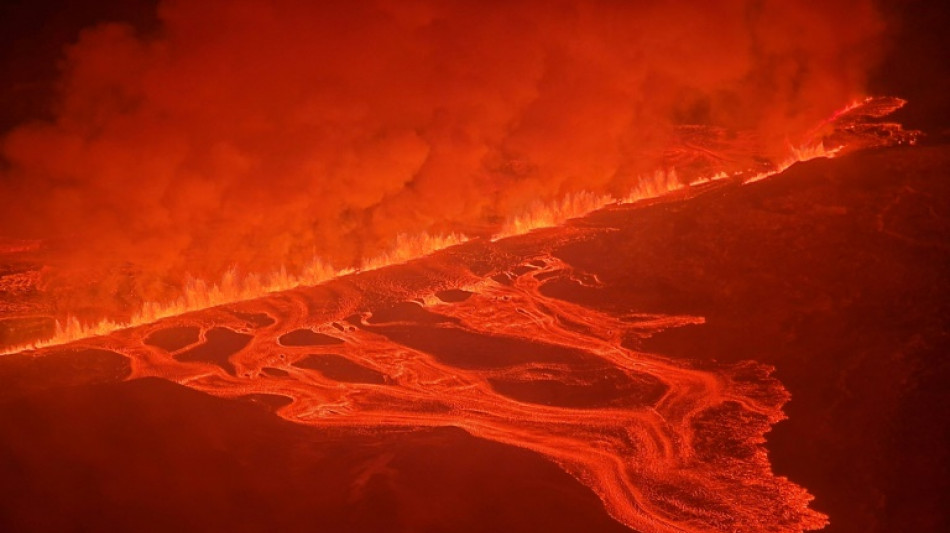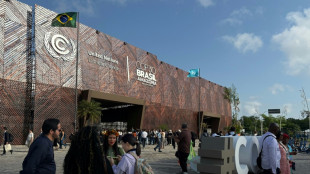
-
 LeBron back in training, edges closer to Lakers return
LeBron back in training, edges closer to Lakers return
-
Climate talks run into night as COP30 hosts seek breakthrough

-
 Germany and Netherlands lock up World Cup spots in style
Germany and Netherlands lock up World Cup spots in style
-
Germany's Woltemade hopes for 2026 World Cup spot after scoring again

-
 Germany 'send message' with Slovakia rout to reach 2026 World Cup
Germany 'send message' with Slovakia rout to reach 2026 World Cup
-
Trump unveils fast-track visas for World Cup ticket holders

-
 Netherlands qualify for World Cup, Poland in play-offs
Netherlands qualify for World Cup, Poland in play-offs
-
Germany crush Slovakia to qualify for 2026 World Cup

-
 Stocks gloomy on earnings and tech jitters, US rate worries
Stocks gloomy on earnings and tech jitters, US rate worries
-
'In it to win it': Australia doubles down on climate hosting bid

-
 Former NFL star Brown could face 30 yrs jail for shooting case: prosecutor
Former NFL star Brown could face 30 yrs jail for shooting case: prosecutor
-
Fate of Canada government hinges on tight budget vote

-
 New research measures how much plastic is lethal for marine life
New research measures how much plastic is lethal for marine life
-
Mbappe, PSG face off in multi-million lawsuit

-
 EU defends carbon tax as ministers take over COP30 negotiations
EU defends carbon tax as ministers take over COP30 negotiations
-
McCartney to release silent AI protest song

-
 Stocks tepid on uncertainty over earnings, tech rally, US rates
Stocks tepid on uncertainty over earnings, tech rally, US rates
-
Louvre shuts gallery over ceiling safety fears

-
 'Stranded, stressed' giraffes in Kenya relocated as habitats encroached
'Stranded, stressed' giraffes in Kenya relocated as habitats encroached
-
US Supreme Court to hear migrant asylum claim case

-
 Western aid cuts could cause 22.6 million deaths, researchers say
Western aid cuts could cause 22.6 million deaths, researchers say
-
Clarke hails Scotland 'legends' ahead of crunch World Cup qualifier

-
 S.Africa says 'suspicious' flights from Israel show 'agenda to cleanse Palestinians'
S.Africa says 'suspicious' flights from Israel show 'agenda to cleanse Palestinians'
-
South Korea pledges to phase out coal plants at COP30

-
 Ex-PSG footballer Hamraoui claims 3.5m euros damages against club
Ex-PSG footballer Hamraoui claims 3.5m euros damages against club
-
Mbappe, PSG in counterclaims worth hundreds of millions

-
 Two newly discovered Bach organ works unveiled in Germany
Two newly discovered Bach organ works unveiled in Germany
-
Stocks lower on uncertainty over earnings, tech rally, US rates

-
 Barca to make long-awaited Camp Nou return on November 22
Barca to make long-awaited Camp Nou return on November 22
-
COP30 talks enter homestretch with UN warning against 'stonewalling'

-
 France makes 'historic' accord to sell Ukraine 100 warplanes
France makes 'historic' accord to sell Ukraine 100 warplanes
-
Delhi car bombing accused appears in Indian court, another suspect held

-
 Emirates orders 65 more Boeing 777X planes despite delays
Emirates orders 65 more Boeing 777X planes despite delays
-
Ex-champion Joshua to fight YouTube star Jake Paul

-
 Bangladesh court sentences ex-PM to be hanged for crimes against humanity
Bangladesh court sentences ex-PM to be hanged for crimes against humanity
-
Trade tensions force EU to cut 2026 eurozone growth forecast

-
 'Killed without knowing why': Sudanese exiles relive Darfur's past
'Killed without knowing why': Sudanese exiles relive Darfur's past
-
Stocks lower on uncertainty over tech rally, US rates

-
 Death toll from Indonesia landslides rises to 18
Death toll from Indonesia landslides rises to 18
-
Macron, Zelensky sign accord for Ukraine to buy French fighter jets

-
 India Delhi car bomb accused appears in court
India Delhi car bomb accused appears in court
-
Bangladesh ex-PM sentenced to be hanged for crimes against humanity

-
 Leftist, far-right candidates advance to Chilean presidential run-off
Leftist, far-right candidates advance to Chilean presidential run-off
-
Bangladesh's Hasina: from PM to crimes against humanity convict

-
 Rugby chiefs unveil 'watershed' Nations Championship
Rugby chiefs unveil 'watershed' Nations Championship
-
EU predicts less eurozone 2026 growth due to trade tensions

-
 Swiss growth suffered from US tariffs in Q3: data
Swiss growth suffered from US tariffs in Q3: data
-
Bangladesh ex-PM sentenced to death for crimes against humanity

-
 Singapore jails 'attention seeking' Australian over Ariana Grande incident
Singapore jails 'attention seeking' Australian over Ariana Grande incident
-
Tom Cruise receives honorary Oscar for illustrious career


How an unprecedented magma river surged beneath an Iceland town
A river of magma flowed underneath an Icelandic fishing village late last year at a rate never before recorded, scientists said Thursday, as the region suffered yet another dramatic eruption.
Authorities in Iceland declared a state of emergency on Thursday as lava burst a key water pipe during the third volcanic fissure to hit the western Reykjanes peninsula since December.
Before 2021, the peninsula had not seen an eruption in 800 years, suggesting that volcanic activity in the region has reawoken from its slumber.
After analysing how magma shot up from a reservoir deep underground through a long, thin "vertical sheet" kilometres below the village of Grindavik in November, researchers warn that this activity is showing no signs of slowing down.
That prediction seemed to be borne out by the latest fissure that split the Earth's surface near the now-evacuated village, which occurred just hours before the new study was published in the journal Science.
Lead study author Freysteinn Sigmundsson, a researcher at the University of Iceland's Nordic Volcanological Centre, told AFP that it was difficult to say how long this new era of eruptions would continue.
But he estimated there were still months of uncertainty ahead for the threatened region.
- A mighty molten river -
Over six hours on November 10, the surging magma created a so-called dyke underground that is 15 kilometres (nine miles) long and four kilometres (2.5 miles) high but only a few metres wide, the study said.
Before Thursday's eruption, 6.5 million cubic metres of magma had accumulated below the region encompassing Grindavik, according to the Icelandic Meteorological Office.
The magma had flowed at 7,400 cubic metres per second, "a scale we have not measured before" in Iceland or elsewhere, Sigmundsson said.
For comparison, the average flow of the Seine river in Paris is just 560 cubic metres a second. The magma flow was closer to those of larger rivers such as the Danube or Yukon.
The magma flow in November was also 100 times greater than those seen before the recent eruptions on the peninsula from 2021 to 2023, Sigmundsson said.
"The activity is speeding up," he said.
The November magma flow precipitated more serious eruptions in December, last month and again on Thursday.
Increasing underground pressure has also led to hundreds of earthquakes and pushed the ground upwards a few millimetres every day, creating huge cracks in the ground and damaging infrastructure in and around Grindavik.
The hidden crevasses that have riddled the town likely pose more danger than lava, Sigmundsson said, pointing to one discovered in the middle of a sports pitch earlier this week.
- More magma to come -
The village, as well as the nearby Svartsengi power plant and the famed Blue Lagoon geothermal spa, have been repeatedly evacuated because of the eruption threats.
The long-term viability of parts of the region sitting on such volatile ground has become a matter of debate.
Sigmundsson emphasised that such decisions were up to the authorities, but said this was definitely "a period of uncertainty for the town of Grindavik".
"We need to be prepared for a lot more magma to come to the surface," he said.
The researchers used seismic measurements and satellite data to model what was driving the magma flow.
Iceland sits on the Mid-Atlantic Ridge, a crack in the ocean floor separating the Eurasian and North American tectonic plates.
As these plates have slowly moved apart over the last eight centuries, "tectonic stress" built up that was a key driving force for magma to surge through the underground geological crack, Sigmundsson said.
The researchers hope their analysis could inform efforts to understand what causes eruptions in other areas of the world.
F.AbuShamala--SF-PST




